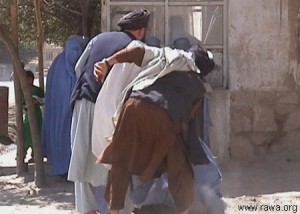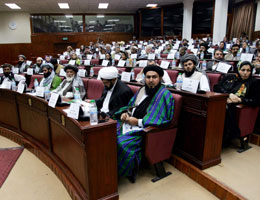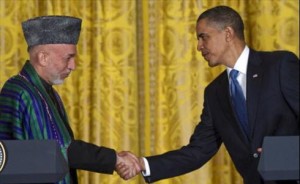On May 12, 2010, in Washington DC, arguably the most powerful man in the world, United States President Barack Obama, publicly supported the efforts of Afghanistan President Karzai for reconciliation with those supporting the Taliban supremacist ideology.
The basis for such a planned surrender to defiance against supporters of the Taliban, which have been amongst the most notorious human rights violators in history, was based on two points:
1. The Taliban are not all really the Taliban. President Karzai and President Obama argue that many Taliban supporters do not support the Taliban ideology. President Karzai states that “there are thousands of the Taliban who are not ideologically oriented,” and President Obama states that “the Taliban is a loose term for a wide range of different networks, groups, fighters, with different motivations.” In fact, the word “Taliban” means “students,” and many of their original recruits came from madrassas supporting their ideology. The Encyclopedia of Islam & the Muslim World describes the Taliban ideology as an “innovative form of sharia combining Pashtun tribal codes.” To describe the Taliban as anything other than the “students” of this ideology, simply ignores the very meaning of the word “Taliban.” Moreover, it places very real and disingenuous blinders about the supremacist views that Taliban “students” have.

Afghanistan Taliban "Police" Beat Women in Public - in Kabul - in 2001 - We Must Never Let Afghanistan Return to This
2. Support for the Afghanistan Constitution indicates a support for Universal Human Rights. On May 12, 2010, U.S. President Obama stated that: “the United States supports the efforts of the Afghan government to open the door to Taliban who cut their ties to Al-Qaeda, abandon violence, and accept the Afghan constitution, including respect for human rights. I look forward to a continued dialogue with our partners on these efforts.” Since 2004, a key question that has not been clearly answered is whether referencing the Universal Declaration of Human Rights as something to be “observed” constitutes support of unqualified, universal human rights in the Islamic Republic of Afghanistan. But recent history in Afghanistan continues to make this an ever-concerning question. Inviting the Taliban back into political and public roles in Afghanistan society will only further make this question more evident, no matter how inconvenient that question may be. (It is noteworthy that not a single press question on the subject of human rights was recorded at the May 12, 2010 joint Obama/Karzai news conference.)

Afghan Parliament Calling for Death Penalty for Apostates According to "the laws in place in Afghanistan" (Photo: Gulf Times)
Let’s also be clear as well – creating a nation-state whose name embodies only one religion should be the starting point to ask questions about its legitimate support for our unqualified universal human rights and religious pluralism. Certainly, it would be a question if the U.S. was not the United States of America, but was instead renamed the “Christian United States of America.” Such a decision would rightly be a cause for global criticism and condemnation. But when a nation is named the “Islamic Republic of Afghanistan,” asking questions about its commitment to pluralism is viewed as simply being narrow minded. For pluralism to work, pluralism must be consistent. We can’t expect pluralism in some cities, some states, and some nations, and not others. Just like we can’t have borders around our unqualified, universal human rights.
The Afghanistan Constitution has two clauses that are key to consider here:
— Afghanistan Constitution, Article 3: “In Afghanistan, no law can be contrary to the beliefs and provisions of the sacred religion of Islam.”
— Afghanistan Constitution, Article 7: “The state shall observe the United Nations Charter, inter-state agreements, as well as international treaties to which Afghanistan has joined, and the Universal Declaration of Human Rights.”
Many Americans would be more comfortable reading Article 3 as merely a non-binding cultural statement that reflects a general more, sort of like “In God We Trust” on American coins. But that is not what Article 3 states. What Article 3 states is “no law can be contrary to… Islam.” How do you prove that and ensure equality? How do you prove that and ensure liberty? How do you prove that and ensure universal human rights? The English translation of the Afghan Constitution states that Article 7 calls for “observing” the Universal Declaration of Human Rights. But the word “observe” has multiple meanings in the English language, “observe” can be viewed as “conform with” or merely “to take note of.” Which is it?
For nearly the past 6 years, human rights groups have been asking this question. But no one wants to discuss this question. However, it is a fundamental question now that Presidents Obama and Karzai are using as a baseline to measure whether Taliban supporters can be reconciled and reintegrated within the Afghanistan government, military, and political system. How else do they plan to gauge whether Taliban supporters will now support “human rights,” as President Obama stated they must on May 12? They will simply ask him if he supports the Afghanistan constitution, and expect that no one will be impertinent enough to ask the obvious question “has support for the Afghanistan constitution demonstrated support for human rights?”
With Afghan girls imprisoned by Afghanistan courts for fleeing forced marriages, with an Afghanistan government that first sought to pass a law guaranteeing marital rape (and then when global pressure became too great – quietly passing it instead as guaranteeing the right to starve your wife if you don’t get on-demand sex), with an Afghanistan parliament calling for the death penalty for someone who chooses the freedom of conscience to leave Islam because his “apostasy” was “contrary to the laws in place in Afghanistan,” the answer to this question should be clear. But this is simply what human rights groups have been saying for years, while world leaders refused to listen. How will such denial impact America’s willingness to allow a rehabilitation and political resurgence of the Taliban in Afghanistan?
What Others Have Said
In 2004, Equality Now reported in a December 2004 report “Action 21.3 – Access to Justice for Afghan Women” on this subject. In the Equality Now posting, the author stated: Article 22 of this Constitution provides: ‘Any kind of discrimination and privilege between the citizens of Afghanistan are prohibited. The citizens of Afghanistan — whether man or woman — have equal rights and duties before the law’. Article 3 of the Afghan Constitution provides that ‘no law can be contrary to the beliefs and provisions of the sacred religion of Islam.’ It is critical that the Supreme Court ensures that its judgments harmonize these provisions of the Constitution rather than impose singular interpretations of the Koran that are harmful to women and do not respect the constitutional right to equality between men and women.”
In 2006, Equality Now reported in Action 21.4, that “Following her visit to Afghanistan in 2005, the United Nations Special Rapporteur on Violence Against Women noted that one of the principal causes of pervasive gender-based discrimination and violence against women in Afghanistan is the lack of enforcement of the rule of law. The Special Rapporteur particularly noted that the ‘diverse and contradictory interpretations’ of Sharia Law tended to ‘undermine the establishment of any universal code of conduct’ and worked to legitimize the violation of women’s rights in Afghanistan.”
In 2007, Equality Now reported in Action 2.15 that “Afghanistan ratified the Convention on the Elimination of All Forms of Discrimination Against Women (CEDAW) in March 2003 and adopted a new Constitution in January 2004, which provides for equal rights for women and men before the law. However, women continue to be violently targeted in Afghanistan and denied equal rights and equal protection of the law. The United Nations Development Fund for Women (UNIFEM) published research in 2006 documenting systematic abuse of women’s rights in Afghanistan, including violence against women instigated by state actors such as the army and police, including forced prostitution, forced marriage, rape, kidnapping and sexual assaults. In June 2007 two women journalists were murdered with many others receiving death threats. On 25 September 2006 Safia Ama Jan, the southern provincial head of Afghanistan’s Ministry of Women’s Affairs, was murdered outside the front gate of her Kandahar home. In recent months a large number of schools for girls have been forced to close after being attacked. ”
In 2008, Equality Now reported in Action 2.16 that “Afghanistan ratified the Convention on the Elimination of All Forms of Discrimination against Women (CEDAW) in March 2003 and adopted a new Constitution in January 2004, which provides for equal rights for women and men before the law and protects freedom of speech. However, women continue to be violently targeted in Afghanistan and denied equal rights and equal protection of the law and Malalai Joya remains suspended from parliament.”
In July 2009, the United Nations reported that “Afghan women have limited freedom to escape the norms and traditions that dictate a subservient status for females….Violence, in its acute form, makes it presence felt in widespread lawlessness and criminality. Findings reveal that Afghan women are subjected to an increasingly insecure environment. Women participating in public life face threats, harassment and attacks. In extreme cases, women have been killed for holding jobs that are seen to disrespect traditional practices or are considered ‘un-Islamic.'”
What Are We to Believe, President Obama and President Karzai?
Are we supposed to believe that all of this is because all of these Afghanistan citizens, courts, state actors — ALL reject the Afghanistan constitution?
Or should we instead recognize that they understand the Afghanistan constitution better than Americans do, and the only relevant clause is “In Afghanistan, no law can be contrary to the beliefs and provisions of the sacred religion of Islam,” based on whatever interpretation that individual, the court, that state actor, and even that terrorist, may have of how they view and interpret “Islam?”
With this proven history of inconsistency within the very Afghanistan government and state institutions, and throughout its citizenry on the issue of what “human rights” even mean, let alone what universal human rights women and all human beings deserve, how can we expect “reconciled” Taliban to now “respect human rights” in a way that could possibly mean anything?
This is an inconvenient question for an America tired of war, and tired of Afghanistan’s problems. It is an inconvenient question for an America with financial and plenty of other problems of its own. Even the press is tired of it, as seen by their total unwillingness to ask a single question at the May 12, 2010 press conference on human rights or women’s rights, even when yet more girls’ schools were poison gassed the day before in Afghanistan. They really would rather not discuss this inconvenient question about human rights. It is a distraction from the tactical and detailed topics that are less troubling to discuss. With growing threats from Pakistan and Iran, some even view that Afghanistan is simply something Americans can no longer afford to pay attention to.
But we have another choice – the ability not to be driven only to a path of ultimate failure, but to address conflicts honestly and show the courage of our convictions and our support to human rights to the world.
Instead of fleeing from Afghanistan as a hopeless disaster, we could also choose to honor the sacrifices of the lives of American men and women by challenging Afghanistan to become an example instead.
America: Learning from Our Own History of Supremacism
For American readers, imagine in 1961, if President John F. Kennedy decided not to challenge the ideology of the white supremacist Ku Klux Klan (KKK). Imagine if he chose instead to convince us that really that the KKK was just a “loose term” for a lot of people who are uneducated, come from broken homes, and have had career and financial challenges, and instead believed that “there are thousands of the KKK who are not ideologically oriented.”
Moreover, imagine if President John F. Kennedy then decided to encourage members of the Ku Klux Klan to leave that terrorist organization by offering them the incentives of government jobs, even positions in the U.S. military and police forces, if they accepted a U.S. Constitution that calls for equal rights.
Where would America have ended up if we never faced the ideology of white supremacy and defied it as a nation?
America’s documented commitment to equal rights were part of its founding identity from its very Declaration of Independence. Yet despite this, slavery existed. Despite the declaration that “all men are created equal,” a form of racial apartheid existed throughout many parts of America even into the 20th century. In 1961, the United States had been a signatory to the Universal Declaration of Human Rights for 13 years – and still racial supremacism and apartheid style laws of racial segregation existed in many parts of America. The Declaration of Independence was not enough and our Constitution was not enough. We had to amend our very Constitution to guarantee the racial equality that was inherently promised in our national identity since July 4, 1776. America has made more than its share of mistakes. We have done things the hard way, the wrong way, many, many times before. Haven’t we learned from our lessons and national struggles in defying supremacism?
If we KNOW this, and we have seen, with our eyes and our own history, what it takes to defy supremacist ideologies, why do we believe that Afghanistan will somehow be different? Why do we believe that agreeing with the Afghanistan government’s plan to “reconcile” with Taliban supporters who will claim to support the Afghanistan constitution and “human rights” has one iota of credibility, without challenging the Taliban’s supremacist ideology?
We know better. Too many are too tired, too distracted, and too discouraged to acknowledge what we know. But we have also learned another lesson in history that problems delayed are not problems denied. Such problems continue to plague us over and over again, and the mistakes that we make in Afghanistan will also set expectations for making similar mistakes in other parts of the world.
Another Choice for Afghanistan
What if instead of surrender and abandoning the sacrifices of so many in Afghanistan, we chose to make a stand for freedom and human rights? What if we challenged Afghanistan to accept the Universal Declaration of Human Rights not just as an “observation” in their constitution, but as fundamental to their law and acceptance of pluralism in a new nation of Afghanistan – not just for Muslims but for all Afghan citizens? What if denied accepting any reconciliation of the Taliban until a new plan of national re-education was conducted explaining that Afghan citizens would accept pluralism, women’s rights, and human rights as part of their identity of as a new nation of Afghanistan?
What if all our efforts were not towards just an “Islamic Republic of Afghanistan,” but instead to a “Free Republic of Afghanistan?”
The managers of our resources and our tactics will argue that such choices are impossible, unacceptable. They will argue that the die is cast for Afghanistan and that choosing another path is impossible.
But as we have seen wherever we have not challenged such supremacist ideologies, we continue to see a drip, drip, drip affect of hate, abuse of women and religious minorities, and international terrorism continue to grow.
We have given billions of dollars to the Islamic Republic of Pakistan, but very little of our own lessons on challenging supremacism and our own commitment to universal human rights. The price that we continue to pay is a growing terrorist threat to the American homeland, to Pakistan, and the world from the very same Taliban ideology that in Afghanistan, U.S. President Obama says on May 12, 2010, he is willing to open the door to “reconcile” with. This is the very same Taliban ideology that reportedly shaped a recent terrorist who plotted to attack America in New York City’s Times Square.
Seeking a different direction for Afghanistan would be very painful, costly, and difficult.
But in the long run, won’t the alternative be even worse?
If we legitimize those who support the ideology of the Taliban to “reconcile” with the Afghanistan government, what have we learned?
Let us choose instead to be Responsible for Equality And Liberty.



